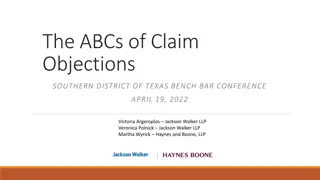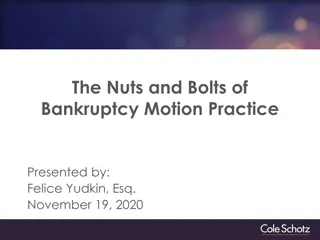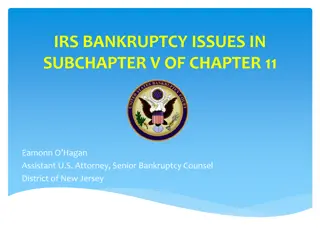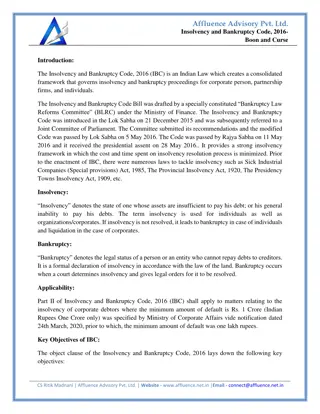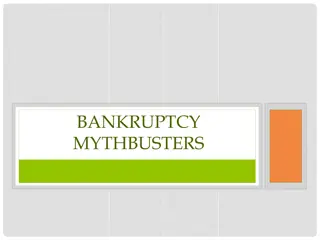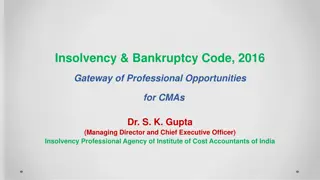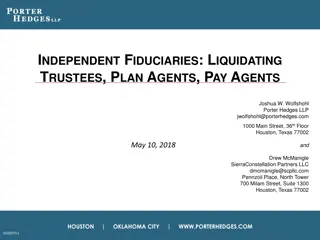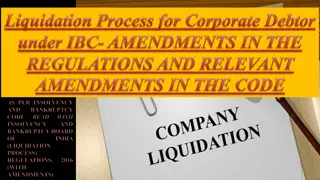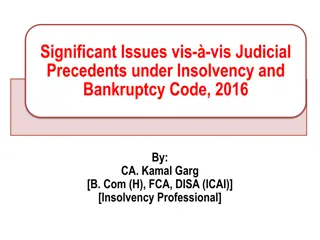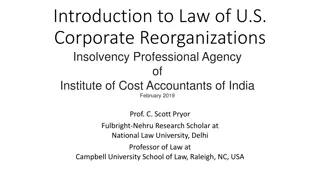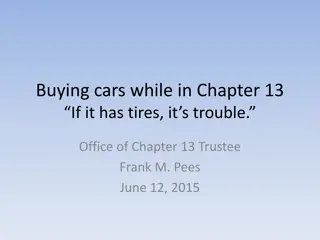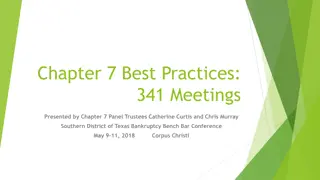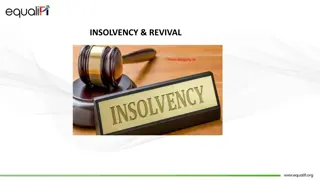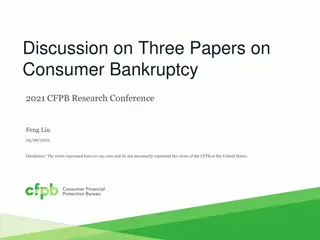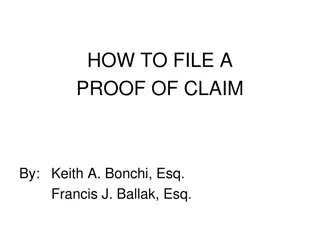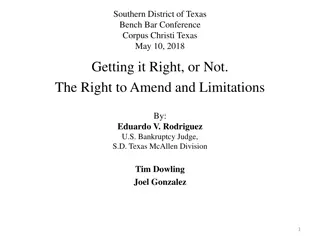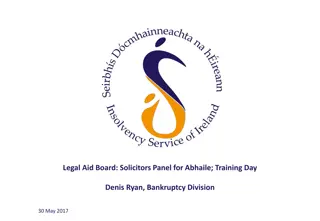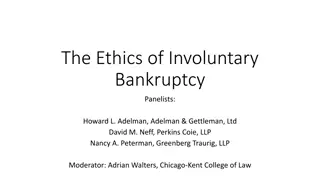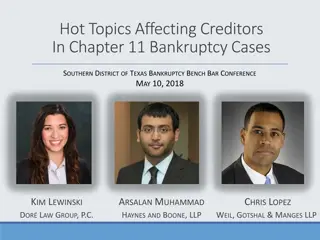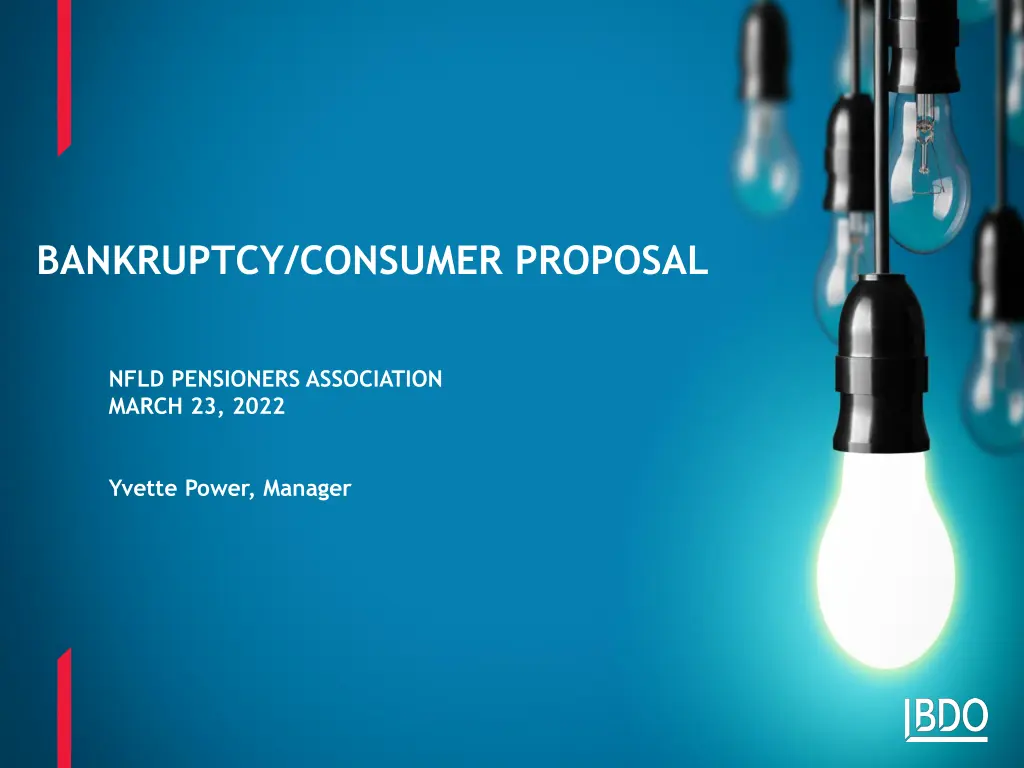
Understanding Personal Bankruptcy and Financial Solutions
Learn about the warning signs, causes, and solutions for financial difficulties, including personal bankruptcy. Discover the process, eligibility, duration, and implications of filing for bankruptcy, along with tips for budgeting and financial planning.
Download Presentation

Please find below an Image/Link to download the presentation.
The content on the website is provided AS IS for your information and personal use only. It may not be sold, licensed, or shared on other websites without obtaining consent from the author. If you encounter any issues during the download, it is possible that the publisher has removed the file from their server.
You are allowed to download the files provided on this website for personal or commercial use, subject to the condition that they are used lawfully. All files are the property of their respective owners.
The content on the website is provided AS IS for your information and personal use only. It may not be sold, licensed, or shared on other websites without obtaining consent from the author.
E N D
Presentation Transcript
BANKRUPTCY/CONSUMER PROPOSAL NFLD PENSIONERS ASSOCIATION MARCH 23, 2022 Yvette Power, Manager
Warning signs of financial difficulty Receiving frequent calls from creditors/collection agencies Having no savings Spending all your money before payday Robbing Peter to pay Paul Using your credit cards or other loans to pay for everyday expenses Having trouble making the minimum payments on your credit cards Budgeting & Financial Planning Page 2
Causes of financial difficulty Employment problems Substance abuse Compulsive spending Medical problems Marriage breakdown Business failure Overburdened by consumer credit Budgeting & Financial Planning Page 3
Solutions for financial problems Self-discipline (needs vs. wants) Informal proposal (on your own) Debt retirement program Loan consolidation Formal proposal Personal bankruptcy Budgeting & Financial Planning Page 4
Personal bankruptcy What is bankruptcy? Process that allows someone to get a fresh start by forgiving most, if not all, of their debts Do I qualify for bankruptcy? Must owe at least $1,000 and be unable to make payments to your creditors as they become due What happens to my wages during the bankruptcy? When you go bankrupt your wages will still be paid directly to you Depending on your income you may be required to pay a portion of your income each month to the trustee - this is referred to as surplus income Budgeting & Financial Planning Page 5
Personal bankruptcy How long am I bankrupt? First time bankrupts without surplus income are eligible for an automatic discharge after 9 months. First time bankrupts will surplus income are eligible after 21 months Second time bankruptcies will last between 24-36 months depending whether there is surplus income Do I continue to pay my creditors when I go bankrupt? Payments stop immediately to all creditors Most law suits and wage attachments are stopped Your trustee will now deal with your creditors on your behalf However, if you have a mortgage or vehicle loan you can continue to pay those creditors after you file bankruptcy if you want to keep the assets Budgeting & Financial Planning Page 6
Personal bankruptcy If I go bankrupt, will I lose everything? The Bankruptcy and Insolvency Act allow you to keep various assets House Equity calculation $100,000 Value of house 6,000 Real Estate 6% 2,000 Legal Fees 85,000 Payout on Mortgage $ 7,000 Exempt $100,00 Value of house 6,000 Real Estate Fee 2,000 Legal Fees 75,000 Payout on Mortgage $17,000 10,000 Exemption $ 7,000 Equity Budgeting & Financial Planning Page 7
Personal bankruptcy What will happen to someone who co-signed a loan for me? Anyone who has consigned a loan for you will still be responsible for the payment after you go bankrupt What happens if I co-signed a loan for someone? If you go bankrupt you are no longer responsible as a co-signor on that particular loan What should I do about my banking if I go bankrupt? Open a new bank account before going bankrupt or filing a consumer proposal, at a bank where you have never done business or had a credit card Does filing for bankruptcy affect my spouse? No Your debts are your debts; only you are responsible for them Your husband or wife or common-law spouse is NOT responsible for your debts Budgeting & Financial Planning Page 8
Personal bankruptcy What happens to my credit rating if I go bankrupt? Most likely, if you have serious financial problems and are considering filing for bankruptcy, your credit rating has already been impacted Bankruptcy can actually help to clear up your credit rating over time Who files my income tax returns? Your Trustee will file your prior year income tax return if it is outstanding and will also the tax return for the year of your bankruptcy Your refund will be property of your bankruptcy estate What happens to my income tax arrears? Income tax debts are also written off in a bankruptcy Will I lose my GST? You will not lose Your GST when you file bankruptcy Budgeting & Financial Planning Page 9
Personal bankruptcy Are student loans written off in a bankruptcy? Yes once you have been out of school for 7 years What kind of counseling is available As part of the bankruptcy process there are two counseling sessions at various stages throughout the bankruptcy. The first session is to assist the debtor to improve money management and budgeting skills The second sessions helps debtor understand the contributing causes of their money problems Who will find out that I have declared bankruptcy? Most bankruptcies do not appear in the paper Your creditors will be notified The Court The Superintendent of Bankruptcy Records are also kept on file by credit reporting agencies Budgeting & Financial Planning Page 10
Personal bankruptcy Do any debts survive bankruptcy? Certain fines or penalties imposed by the Court Alimony, maintenance or child support Any debts arising out of fraudulent misrepresentation What effect will bankruptcy have on my credit rating? Approximately seven years Budgeting & Financial Planning Page 11
Consumer proposal Usually provides for payment of % of total debt Debts cannot exceed $250K (excludes principle residence mortgage) Must be approved by creditors Regular payments over a specified time period not exceeding 5 years Impact on credit record may be less severe than bankruptcy Budgeting & Financial Planning Page 12

